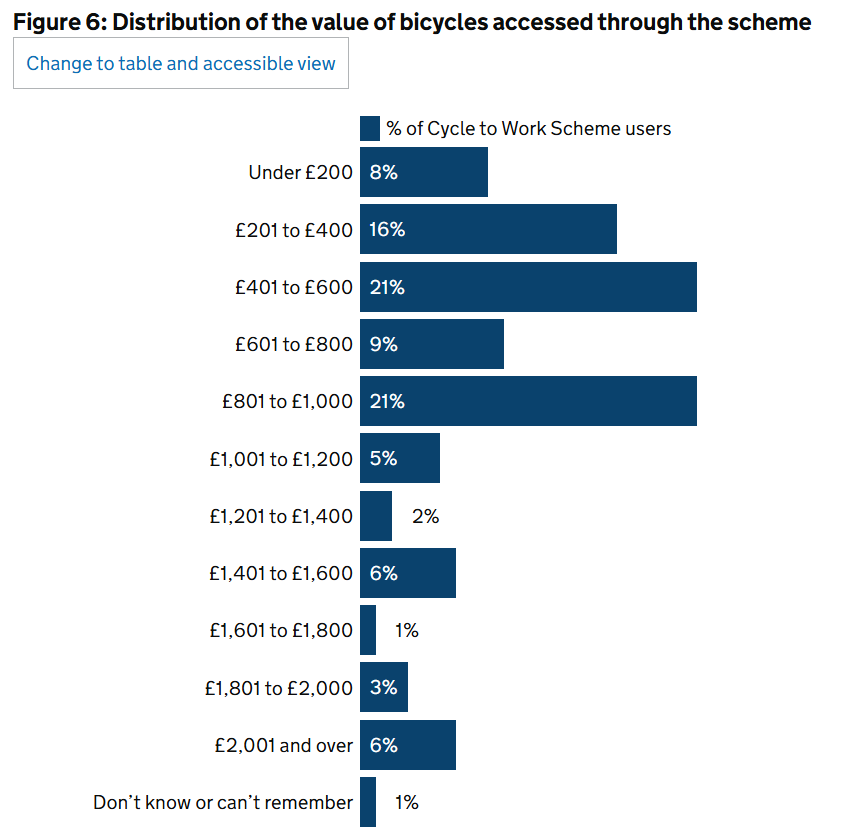Cycle to Work under attack? #189
Flawed scheme needs fixing, not flushing
This week has been a steady drip of briefings about where the Autumn budget axe will land. One suggestion is a lower cap on Cycle to Work. The scheme isn’t perfect, but a blunt cap feels like the laziest option, with very little impact.
BIG STORIES FOR CYCLING ADVOCACY
CYCLE TO WORK ON THE ROCKS? There’s been understandable outrage on a proposed reduction on the value of bikes available on the tax-break scheme. The language from government ‘sources’ on £4,000 bikes being ridden at weekends in the Surrey Hills hasn’t helped. Bikes can be expensive, not least cargo cycles and e-bikes, car replacements which are known to help more people cycle for more journeys. Cycle shops are concerned a £2,000 cap would eliminate much or all of their stock, while the health and decongestion benefits of cycling can only be realised if people have access to bikes. In all, a false economy.
COPENHAGENIZE THE WORLD. The Copenhagenize index ranks cities globally based on their cycle-friendliness. The team behind it says it’s all about data: the cities at the top have done more than build cycle routes; they’ve normalised cycling as a means of daily travel. The usual suspects are at the top: Utrecht, Copenhagen, Amsterdam and now Ghent, and unsurprisingly Paris is on the rise, as is Helsinki. However, less-vaunted cities like Montreal, Bordeaux and Strasbourg have been praised for ‘steady investments in all key aspects of bicycle policy’. It’s something for other cities to aim for.
EVIDENCE FOR CARROTS. When we talk about behaviour change, there are carrots and sticks. With public resistance to things like increasing driving costs, this new study looks at the evidence behind ‘non-coercive policy measures’, or carrots. That includes things like improvements to the alternatives (cycling, walking, public transport), increased density in urban planning, and travel behaviour change programmes. It found that while such measures yield significant other benefits, the study concludes they can’t meet emissions targets as quickly as needed.
100 MOBILITY CHANGEMAKERS. A lot of people work quietly to help improve transport options for people, without the expectation of recognition. That said, it’s nice to see Zag’s ‘100 mobility changemakers’ list. It includes a bike mapping app founder, Paris’ deputy mayor for transport and urban mobility advisor Melissa Bruntlett. Closer to home, we’ve the UK Transport Secretary, Heidi Alexander, Bikeability Trust CEO Emily Cherry and the London Cycling Campaign’s Simon Munk.
REALITY - OR BLACK MIRROR EPISODE? We are living in a real-life episode of Black Mirror: an app dispatches riders, monitors their every move, while riders - some using rented identities - risk abuse, exhaustion and invisibility. As one delivery rider put it in this shocking article about life as a delivery rider, “We are a very modern kind of slave.” What they experience are 10-12 hour days, low pay, risk of injury and harassment, and the likelihood of exhaustion. One rider described the treatment of workers like him as ‘third-class citizens’.
OTHER HEADLINES
MAN IN PINK HAT CELEBRATES EARLY MORNINGS. For something a little lighter, Johno Verity is known by some as London’s bicycling historian. ‘Who’d have thought that a middle aged guy with a pink hat banging on about the history of London would do so well’, he told Cycling Weekly a few weeks back. Johno says he wakes up “aggressively early”, and he uses that time to ride around London’s deserted streets, sharing snippets of history knowledge to his Instagram followers. His videos evoke the simple joy of riding a bike.
INTERESTING GRAPH OF THE WEEK:
A small proportion of Cycle to Work scheme bikes are above £2,000 (6%), countering the narrative that it’s about rich guys riding £4k bikes in Surrey. What a £2,000 cap could potentially do is limit those who need more expensive bikes if they are to replace car journeys. Source: https://www.gov.uk/government/publications/evaluation-of-the-cycle-to-work-scheme/evaluation-of-the-cycle-to-work-scheme-quantitative-and-qualitative-research
ACTIVE TRAVEL WORD OF THE WEEK:
Salary sacrifice. A scheme whereby a part of your cash income can be swapped for non-cash benefits, tax-free. This can include goods like bikes, laptops, and even car hire or lease; or services like childcare, gym memberships. It is different to a more direct benefit, let’s say, like a £3,750 grant off the price of an electric car, which could be used, I don’t know, for leisure drives around Surrey?
Until next time,
Adam
Adam Tranter
CEO, Fusion & Founder, #BikeIsBest
This newsletter is brought to you by Fusion, the agency for movers, specialising in communications and public affairs for active travel and mobility.






